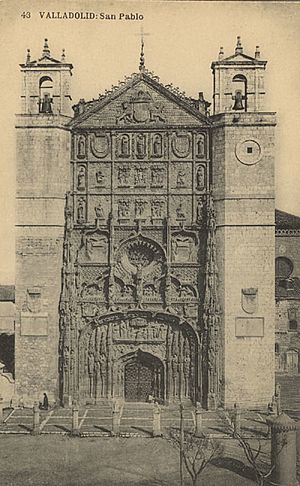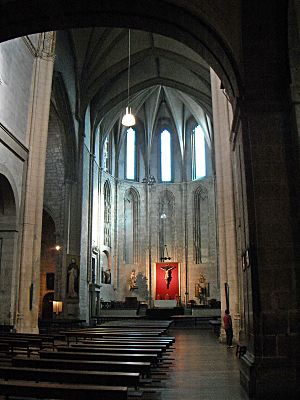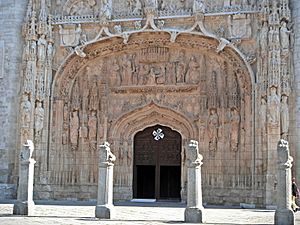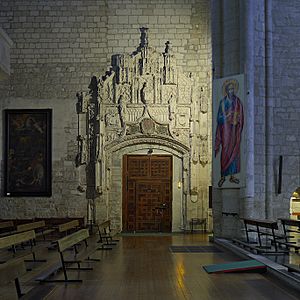Iglesia de San Pablo, Valladolid facts for kids
Quick facts for kids St. Paul's Convent church |
|
|---|---|
|
Iglesia conventual de San Pablo
|
|
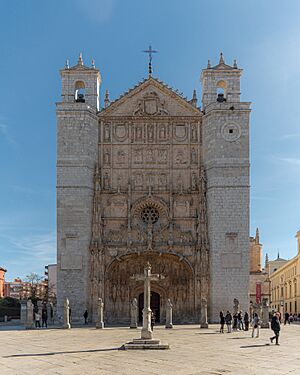
Façade of the church
|
|
| Religion | |
| Affiliation | Catholic |
| District | Valladolid |
| Status | Active |
| Location | |
| Location | |
| Architecture | |
| Architectural style | Isabelline Gothic (Gothic), Plateresque (Renaissance) |
| Completed | 1445-1616 |
| Direction of façade | Southwest |
| Official name: Iglesia conventual de San Pablo | |
| Type | Monument |
| Designated | 03-06-1931 |
| Reference no. | RI-51-0000983 |
The Church of San Pablo (also known as San Pablo de Valladolid) is a very old and famous church in the city of Valladolid, Spain. It used to be part of a Dominican monastery. The church was built in a special style called Isabelline Gothic.
Construction started in 1445 by Cardinal Juan de Torquemada. The church was finished and improved over many years, until 1616. Two Spanish kings, Philip II and Philip IV of Spain, were baptized here. Even Napoleon visited this important building. It is one of the most well-known buildings in Valladolid.
Contents
History of San Pablo Church
The church you see today replaced an older one. That first church had a wooden roof. It was next to a Dominican monastery that began in 1270. Cardinal Torquemada wanted a new, grander church.
Building the Church and Monastery
After Cardinal Torquemada passed away, Bishop Alonso de Burgos helped fund more parts of the building. He paid for the cloister (a covered walkway), the refectory (dining hall), and the lower part of the church's façade (front). He also helped build the nearby Colegio de San Gregorio, which had a special chapel for burials.
Artists like Juan Guas and Simón de Colonia worked on the church during this time. Around 1550, Cardinal Juan Garcia Loaysa added the sacristy. This room has a beautiful dome decorated with stars and symbols of the Dominican order. The main part of the church, called the nave, has rib vaults. These are special arched ceilings supported by decorative brackets called corbels. These were added around 1540.
Changes by the Duke of Lerma
Later, the capital city of Spain moved from Valladolid to Madrid. The church then received support from the Duke of Lerma. He had the church's front redesigned and added many new artworks inside.
Between 1613 and 1616, Juan de Nates worked on the church. He followed a design by Francisco de Mora. This work included a special balcony for the Duke and a grand gate for the sacristy.
What the Church Looks Like
The Church of San Pablo was built in a style popular in the late Gothic period. It has one main aisle, called a nave. Along the sides, there are small chapels between the buttresses (supports on the outside walls). The church also has a raised choir area and a transept, which is the part that crosses the main aisle.
The Transept and Chapels
At the ends of the transept, there are two stone doorways. These were made around 1490 by Simón de Colonia's workshop. The one on the left leads to the Chapel of the Crucifix. The one on the right used to lead to Bishop Alonso de Burgos's burial chapel.
The Famous Façade
The front of the church, called the façade, was designed by Simón de Colonia and finished in 1500. You can see two main parts to it. The lower part, up to the large round window (rose window), has interesting gargoyles. It is also flanked by two tall, pointed towers called spires.
The main entrance is surrounded by a large arch. Inside this arch, there is a relief sculpture. It shows the Coronation of the Virgin with Bishop Alonso de Burgos present. The upper part of the façade has rectangular spaces leading up to the very top.
When the Duke of Lerma funded renovations, some older Gothic decorations were used. New ones were also added. The two side towers were built during this time. The stars you see in the background of the façade are from the coat of arms of the Sandoval y Rojas family, which the Duke belonged to. The Duke of Lerma is buried inside the church.
Inside the Church
Inside the church, there are two chapels near the altar. One has a statue of St Dominic of Guzmán. The other has a statue of Christ. Both of these were made by the artist Gregorio Fernández. He also created other works in the presbytery, which is the area around the altar.
In the transept, you can see two paintings by Bartolomé de Cárdenas. These paintings are called Calling of St Peter and Conversion of St Paul.
See also
 In Spanish: Iglesia de San Pablo (Valladolid) para niños
In Spanish: Iglesia de San Pablo (Valladolid) para niños
 | William Lucy |
 | Charles Hayes |
 | Cleveland Robinson |


